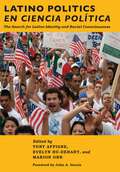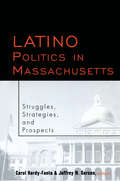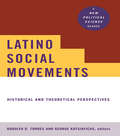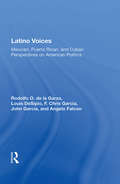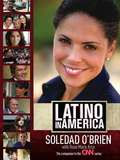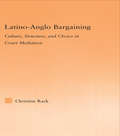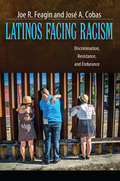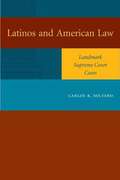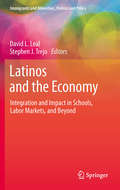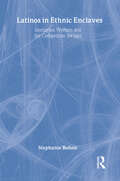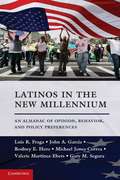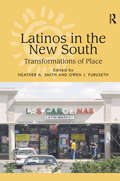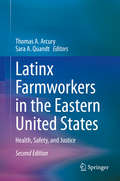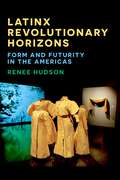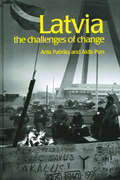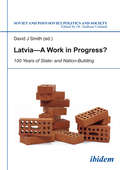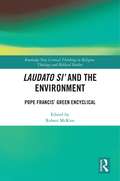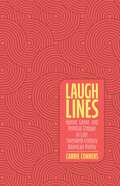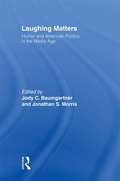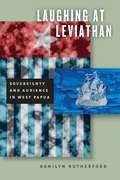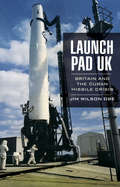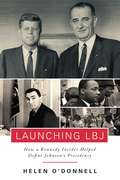- Table View
- List View
Latino Politics en Ciencia Política: The Search for Latino Identity and Racial Consciousness
by Marion Orr Tony Affigne Evelyn Hu-DeHartA &“collection of cutting-edge research&” on the political diversity of Latino communities: &“a must-read for students and researchers alike&” (American Politics). Latinos constitute the largest, fastest-growing, and most diverse minority group in the United States. A critical voting bloc in both Presidential and Congressional races, this demographic will only become more important in future American elections. Latino Politics en Ciencia Política explores the political diversity within this community, and how intra-community differences influence political behavior and policy preferences. The editors and contributors, all noted scholars of race and politics, draw on evidence from the largest-ever scientific survey addressed exclusively to Latino/Hispanic respondents. They examine key issues such as Latino/a identities (latinidad), transnationalism, acculturation, political community, and racial consciousness. The book contextualizes today's research within the history of Latino political studies, from the field's beginnings to the present, explaining how systematic analysis of Latino political behavior has over time become integral to the study of political science. Latino Politics en Ciencia Política is thus an ideal text for learning both the state of the field today, and key dimensions of Latino political attitudes. Instructor&’s Guide included.
Latino Politics in Massachusetts: Struggles, Strategies and Prospects (Race and Politics #4)
by Carol Hardy-Fanta Jeffrey GersonThis collection of original essays explores the major challenges to Latino political representation in cities where Latino populations do not make up the majority of the population and therefore cannot rely on sheer numbers to gain representation.
Latino Representation in State Houses and Congress
by Jason P. CasellasThis book argues that Latino representation in U. S. legislative institutions is shaped not only by demographics but by legislative institutional design, as well as elite-driven methods, features of the electoral system, and the increasing mainstreaming of Latinos in American society. The election of Latino legislators in the United States is thus complex and varied. This book provides evidence on how successful Latinos have been in winning state legislative and congressional districts in which they have no natural advantage. In particular, this book demonstrates that Latino candidates benefit from higher percentages of Latino citizens in the state, more liberal citizenries, and citizen legislatures. Jason Casellas argues that the legislatures most conducive to the election of Latino candidates are Florida, New Mexico, and California, whereas the least conducive are the U. S. House and New York.
Latino Social Movements: Historical and Theoretical Perspectives
by Rodolfo D. Torres George KatsiaficasFirst Published in 1999. Routledge is an imprint of Taylor & Francis, an informa company.
Latino Voices: Mexican, Puerto Rican, And Cuban Perspectives On American Politics
by Rodolfo O. de la GarzaThis book provides basic information about the political values, attitudes and behaviors of Mexican-, Puerto Rican-, and Cuban-origin populations in the United States. It describes the extent to which U.S. citizens of Hispanic origins hold particular views and participate in specific activities.
Latino in America
by Soledad O'Brien Rose Marie ArceThe definitive tie-in to one of the most heavily anticipated CNN documentaries ever, Latino in America, from top CNN anchor and special correspondent Soledad O'Brien. Top CNN anchor and special correspondent Soledad O'Brien brings readers closer to today's Latino experience as well as her own journey in the definitive tie-in to one of the most heavily anticipated CNN documentaries ever, Latino in America. The Latino in America book will deliver more personal and revealing accounts than the documentary and will contain never-before-seen moving interviews, photos, and exclusive insights from O'Brien's travels across the U.S. Watch a Video
Latino-Anglo Bargaining: Culture, Structure and Choice in Court Mediation (Latino Communities: Emerging Voices - Political, Social, Cultural and Legal Issues)
by Christine RackThis book shows the mechanisms by which cultural differences reinforce structural privilege and disadvantage in the informal process of mediated negotiation. Are all people equally likely to pursue their own material self-interest in the negotiation process used in small claims mediation? Did Latinos and Anglos bargain more generously with members of their own group? The central questions, derived from theories of ethnic and gender differences, concerned how, and to what degree; culture, structure, and individual choice operated to alter the goals, bargaining process and outcomes, expressed motivations and outcome evaluations for outsider groups. This book demonstrates how there are real cultural differences in the way that Latinos and Anglos pursue monetary justice that defy dominant assumptions that all culture groups are equally likely to maximize their own outcomes at the expense of others.
Latinos Facing Racism: Discrimination, Resistance, and Endurance
by Joe R. Feagin Jose A. CobasFeagin and Cobas provide the first in-depth examination of the everyday racism faced by middle-class Latinos. Based on a national survey, we learn how a diverse group of talented Latinos Mexican Americans, Puerto Rican Americans, Cuban Americans, and others respond to and cope with the commonplace white racial framing and discriminatory practices. Drawing on extensive interviewing, the authors address the recurring discrimination of ordinary whites directed against Spanish speakers and individuals with presumed Latino phenotypes. These incidents occur in everyday encounters, such as when male and female Latinos travel or shop. The book also chronicles the mistreatment that Latinos face from immigration officials when they cross US borders and from the police when they are racially profiled outside Latino areas. Critical and conforming Latino responses to recurring white discrimination are also extensively examined, as well as the diverse Latino reactions to remedial programs like affirmative action and to the ideal of assimilation into the proverbial US melting pot. "
Latinos and American Law: Landmark Supreme Court Cases
by Carlos R. SolteroTo achieve justice and equal protection under the law, Latinos have turned to the U.S. court system to assert and defend their rights. Some of these cases have reached the United States Supreme Court, whose rulings over more than a century have both expanded and restricted the legal rights of Latinos, creating a complex terrain of power relations between the U.S. government and the country's now-largest ethnic minority. <P><P>To map this legal landscape, Latinos and American Law examines fourteen landmark Supreme Court cases that have significantly affected Latino rights, from Botiller v. Dominguez in 1889 to Alexander v. Sandoval in 2001. Carlos Soltero organizes his study chronologically, looking at one or more decisions handed down by the Fuller Court (1888-1910), the Taft Court (1921-1930), the Warren Court (1953-1969), the Burger Court (1969-1986), and the Rehnquist Court (1986-2005). For each case, he opens with historical and legal background on the issues involved and then thoroughly discusses the opinion(s) rendered by the justices. He also offers an analysis of each decision's significance, as well as subsequent developments that have affected its impact. Through these case studies, Soltero demonstrates that in dealing with Latinos over issues such as education, the administration of criminal justice, voting rights, employment, and immigration, the Supreme Court has more often mirrored, rather than led, the attitudes and politics of the larger U.S. society.
Latinos and the Economy: Integration and Impact in Schools, Labor Markets, and Beyond
by Stephen J. Trejo David L. LealAt 15.4 percent of the population, Latinos are the largest minority group in the United States. They are a growing presence in all sectors of the economy, play an increasingly important role in government and politics, and are influential across a wide range of cultural domains. Despite the growing attention paid to Latinos in recent years, this population is characterized by relatively low socio-economic status, and Latinos frequently rank behind the majority white population and other minority groups when it comes to education, finances, and employment. This book contributes to the understanding of these issues by addressing a comprehensive range of topics on Latino economic incorporation, outcomes, and impact over an individual's lifetime. The volume starts with the foundational issue of education, and then moves to immigrant integration and adjustment, Latino and immigrant earnings, the economic impact of Latinos, and inter-generational incorporation and long-term integration issues. The contributions provide wide-ranging perspectives on the key factors that determine whether Latinos will be able to achieve their economic potential. The substantial individual, national, and international implications of these studies make this book of interest to scholars and policy-makers alike, particularly those concerned with the issues of education, immigration, employment, and earnings. The rapid and continuing growth of the Hispanic population ensures that the debate over social policy in the next few decades will increasingly focus on how best to alleviate the economic and social problems facing this population and perhaps encourage rapid assimilation. The studies in the volume edited by David Leal and Stephen Trejo provide an excellent foundation for this discussion. The conceptual issues and findings in these papers are sure to be valuable to both policy makers and researchers. George Borjas, Robert W. Scrivner Professor of Economics and Social Policy, John F. Kennedy School of Government, Harvard University Latinos and the Economy provides a truly authoritative but accessible compilation of first-rate scholarship on Hispanic incorporation, educational and political gains, and ongoing economic and cultural impacts. It is "must reading" for anyone concerned about the future, especially as America moves inexorably towards becoming a majority-minority society by mid-century. Daniel T. Lichter, Ferris Family Professor, Department of Policy Analysis and Management, Cornell University This is the volume to read for anyone interested in current American immigration issues or the role of Hispanics in the U.S. economy." Daniel S. Hamermesh, Killam Professor of Economics, University of Texas at Austin "The future of America is closely intertwined with the successful integration--economically, politically, and socially--of the Latino population. Latinos now comprise one of every seven workers and almost one of every five students in the United States. The research reported in this volume describes the challenges faced by Latinos in schools, the labor market, and in communities and explains their prospects for upward mobility. These studies suggest that a significant investment in expanding educational opportunities may be the single most important policy lever to incorporate Latinos into the American mainstream." Charles Hirschman, Professor of Public Affairs and Boeing International Professor of Sociology, University of Washington
Latinos in Ethnic Enclaves: Immigrant Workers and the Competition for Jobs (Latino Communities: Emerging Voices - Political, Social, Cultural and Legal Issues)
by Stephanie BohonThis work explores the competition for jobs between different Latin American immigrant groups in the U.S. economy. Bohon's research looks at occupational status attainment among Latino groups in Miami and three other U.S. cities with flourishing Latino enclaves.
Latinos in the Legislative Process
by Stella M. RouseIn one of the only accounts of Latino legislative behavior, Stella M. Rouse examines how well the growing Latino population translates their increased presence into legislative influence. Latinos in the Legislative Process explores Latino representation by considering the role of ethnicity throughout the legislative process - from bill sponsorship, to committee deliberations, to floor votes - in seven state legislatures. Rouse first identifies issues that are priorities for Latinos and tells us whether a Latino political agenda exists. She then provides a theoretical framework for ethnicity in legislative behavior and outcomes. Rouse demonstrates that ethnicity is a complex dynamic that plays a variable role in the legislative process. Thus, Latino representation cannot be viewed monolithically.
Latinos in the New Millennium
by John A. Garcia Michael Jones-Correa Valerie Martinez-Ebers Gary M. Segura Rodney E. Hero Luis R. FragaLatinos in the New Millennium is the most current and comprehensive profile of Latinos in the United States: looking at their social characteristics, group relations, policy positions and political orientations. The authors draw on information from the 2006 Latino National Survey (LNS), the largest and most detailed source of data on Hispanics in America. This book provides essential knowledge about Latinos, contextualizing research data by structuring discussion around many dimensions of Latino political life in the US. The encyclopedic range and depth of the LNS allows the authors to appraise Latinos' group characteristics, attitudes, behaviors and their views on numerous topics. This study displays the complexity of Latinos, from recent immigrants to those whose grandparents were born in the United States.
Latinos in the New South: Transformations of Place
by Owen J. FurusethLatinos have emerged as one of the fastest-growing ethnic populations in the American South. A 'New South' is taking shape in a region where culture and class relations have traditionally been constructed along black-white divides and experience absorbing culturally or linguistically foreign immigrants has been limited. This book presents a multidisciplinary examination of the impacts and responses across the Southeastern United States to contemporary Latino immigration. The rapid and large-scale movement of Latinos into the region has challenged old precepts and forced Southerners to confront the impacts of globalization and transnationalism in their daily lives. Drawing on theoretical perspectives as well as empirical research, the work provides insights into the Latino experience in both urban and rural locales. Each chapter is centred on the nexus between the immigrants' experiences in settling and adapting to new lives in the American South and the construction of transformed social, economic, political and cultural spaces.
Latinx Farmworkers in the Eastern United States: Health, Safety, and Justice
by Sara A. Quandt Thomas A. ArcuryMigrant and seasonal farmworkers are largely Latinx men, women, and children. They work in crop, dairy, and livestock production, and are essential to the U.S. agricultural economy—one of the most hazardous and least regulated industries in the United States. Latinx migrant and seasonal farmworkers in the eastern United States experience high rates of illness, injury, and death, indicating widespread occupational injustice. This second edition takes a social justice stance and integrates the past ten years of research and intervention to address health, safety, and justice issues for farmworkers. Contributors cover all major areas of health and safety research for migrant and seasonal farmworkers and their families, explore the factors that affect the health and safety of farmworkers and their families, and suggest approaches for further research and educational and policy intervention needed to improve the health and safety of Latinx farmworkers and their families. Among the chapter topics are:Occupational injury and illness in Latinx farmworkers in the eastern United StatesMental health among Latinx farmworkers in the eastern United StatesThe health of women farmworkers and women in farmworker families in the eastern United StatesThe health of children in the Latinx farmworker community in the eastern United StatesCommunity-based participatory research with Latinx farmworker communities in the eastern United StatesFarm labor and the struggle for justice in the eastern United StatesAccessibly written and comprehensive in its scope, this second edition of Latinx Farmworkers in the Eastern United States: Health, Safety, and Justice will find an engaged audience among researchers, students, and practitioners in public health, occupational health, public policy, and social and behavioral sciences, as well as labor advocates and healthcare providers.
Latinx Revolutionary Horizons: Form and Futurity in the Americas
by Renee HudsonA necessary reconceptualization of Latinx identity, literature, and politicsIn Latinx Revolutionary Horizons, Renee Hudson theorizes a liberatory latinidad that is not yet here and conceptualizes a hemispheric project in which contemporary Latinx authors return to earlier moments of revolution. Rather than viewing Latinx as solely a category of identification, she argues for an expansive, historicized sense of the term that illuminates its political potential.Claiming the “x” in Latinx as marking the suspension and tension between how Latin American descended people identify and the future politics the “x” points us toward, Hudson contends that latinidad can signal a politics grounded in shared struggles and histories rather than merely a mode of identification. In this way, Latinx Revolutionary Horizons reads against current calls for cancelling latinidad based on its presumed anti-Black and anti-Indigenous framework. Instead, she examines the not-yet-here of latinidad to investigate the connection between the revolutionary history of the Americas and the creation of new genres in the hemisphere, from conversion narratives and dictator novels to neoslave narratives and testimonios.By comparing colonialisms, she charts a revolutionary genealogy across a range of movements such as the Mexican Revolution, the Filipino People Power Revolution, resistance to Trujillo in the Dominican Republic, and the Cuban Revolution. In pairing nineteenth-century authors alongside contemporary Latinx ones, Hudson examines a longer genealogy of Latinx resistance while expanding its literary canon, from the works of José Rizal and Martin Delany to those of Julia Alvarez, Jessica Hagedorn, and Leslie Marmon Silko. In imagining a truly transnational latinidad, Latinx Revolutionary Horizons thus rewrites our understanding of the nationalist formations that continue to characterize Latinx Studies.
Latvia: The Challenges of Change (Postcommunist States and Nations)
by Artis Pabriks Aldis PursThe past one hundred years have been a very trying time for Latvia, complete with success, tragedy, and still unrealized promise. Within the course of a generation, the country experienced revolutions, wars and independent statehood, and then the slide into authoritarianism. World War II brought new occupations. The tragedies were staggering: holocaust, executions, and an exodus of refugees. Soviet consolidation bred deportations, forced collectivization and partisan warfare. Almost fifty years later, Latvia regained its independence and emerged from decades of disastrous Soviet rule.This book comprehensively surveys Latvia's recent past and prospects for the new millennium, placing contemporary events in historical perspective. The authors address the evolution of the country from the movement against Soviet rule to the dilemmas of contemporary politics: party formation, the problem of corruption, the quest for the future and a regional and international role, the struggle to develop a civil society, the issue of ethnic relations and the recurring tendency towards statist solutions. Proper attention is also given to economic developments.
Latvia—a Work in Progress?: 100 Years of State- and Nation-Building (Soviet and Post-Soviet Politics and Society #142)
by David J. Smith Matthew KottA quarter century after the formation of the Popular Front and a decade since joining the EU, processes of state and nation building in Latvia are still ongoing. Such issues as citizenship, language policy, minority rights, democratic legitimacy, economic stability, and security all remain objects of vigorous public discussion. Today's situation also reflects long-standing debates on the relationship among state, nation, and sovereignty in Latvian society and polity. By examining different aspects of these relationships, this volume reveals both key turning points and continuities in Latvia's development, therefore critically informing current research and debates.
Laudato Si’ and the Environment: Pope Francis’ Green Encyclical (Routledge New Critical Thinking in Religion, Theology and Biblical Studies)
by Robert McKimThis volume is a response to the Pope’s Laudato Si’, giving an interdisciplinary overview of its impact on the environmental concerns of Catholics as well as other religious groups. Published in 2015, it is often seen as an "environmental" encyclical and in it the Pope urges us to face up to the crisis of climate change. He argues that all of us should prioritise taking better care of the Earth, our common home, while also attending to the plight of the poor. Written by an international and multidisciplinary team of leading scholars, the Pope’s invitation to all people to begin a new dialog about these matters is considered from a variety of perspectives. There is discussion of the implications for immigration, population control, eating animals, and property ownership. Additionally, indigenous religious perspectives, development and environmental protection, and the implementation of the ideas of the encyclical in the Church are explored. Each chapter deals with the scriptural, theological, and philosophical underpinnings of the encyclical, as well as other central concepts such as interconnectedness, the role of practice, and what Pope Francis calls the "technocratic paradigm". This book expertly illuminates the relationship between Laudato Si’ and environmental concerns. It will, therefore, be vital reading for anyone studying religion and the environment, environmental ethics, Catholic theology, and environmental thought.
Laugh Lines: Humor, Genre, and Political Critique in Late Twentieth-Century American Poetry
by Carrie ConnersHumor in recent American poetry has been largely dismissed or ignored by scholars, due in part to a staid reverence for the lyric. Laugh Lines: Humor, Genre, and Political Critique in Late Twentieth-Century American Poetry argues that humor is not a superficial feature of a small subset, but instead an integral feature in a great deal of American poetry written since the 1950s. Rather than viewing poetry as a lofty, serious genre, Carrie Conners asks readers to consider poetry alongside another art form that has burgeoned in America since the 1950s: stand-up comedy. Both art forms use wit and laughter to rethink the world and the words used to describe it. Humor’s disruptive nature makes it especially whetted for critique. Many comedians and humorous poets prove to be astute cultural critics. To that end, Laugh Lines focuses on poetry that wields humor to espouse sociopolitical critique. To show the range of recent American poetry that uses humor to articulate sociopolitical critique, Conners highlights the work of poets working in four distinct poetic genres: traditional, received forms, such as the sonnet; the epic; procedural poetry; and prose poetry. Marilyn Hacker, Harryette Mullen, Ed Dorn, and Russell Edson provide the main focus of the chapters, but each chapter compares those poets to others writing humorous political verse in the same genre, including Terrance Hayes and Anne Carson. This comparison highlights the pervasiveness of this trend in recent American poetry and reveals the particular ways the poets use conventions of genre to generate and even amplify their humor. Conners argues that the interplay between humor and genre creates special opportunities for political critique, as poetic forms and styles can invoke the very social constructs that the poets deride.
Laughing Matters: Humor and American Politics in the Media Age
by Jonathan S. Morris Jody C. BaumgartnerThis book examines the role of humor in modern American politics. Written by a wide range of authors from the fields of political science and communication, this book is organized according to two general topics: how the modern media present political humor the various ways in which political humor influences politics. Laughing Matters is an excellent text for courses on media and politics, public opinion, and campaigns and elections.
Laughing at Leviathan: Sovereignty and Audience in West Papua
by Danilyn RutherfordFor West Papua and its people, the promise of sovereignty has never been realized, despite a long and fraught struggle for independence from Indonesia. In Laughing at Leviathan, Danilyn Rutherford examines this struggle through a series of interlocking essays that drive at the core meaning of sovereignty itself--how it is fueled, formed, and even thwarted by pivotal but often overlooked players: those that make up an audience. Whether these players are citizens, missionaries, competing governmental powers, nongovernmental organizations, or the international community at large, Rutherford shows how a complex interplay of various observers is key to the establishment and understanding of the sovereign nation-state. Drawing on a wide array of sources, from YouTube videos to Dutch propaganda to her own fieldwork observations, Rutherford draws the history of Indonesia, empire, and postcolonial nation-building into a powerful examination of performance and power. Ultimately she revises Thomas Hobbes, painting a picture of the Leviathan not as a coherent body but a fragmented one distributed across a wide range of both real and imagined spectators. In doing so, she offers an important new approach to the understanding of political struggle.
Laughter In The Dark: Egypt To The Tune Of Change
by Yasmine El RashidiA decade ago, millions of Egyptians took to the streets in a people-led revolution that captivated the world’s attention and sent ripples across the Middle East. But the so-called “Arab Spring” quickly faded, and a return to the status quo—of authoritarian rule—was cemented. What happened to the energy and desire for change? In Egypt, the answer lies in its youth, who comprise the bulk of the country’s fast-growing 106 million citizens. Sixty percent of the population is under the age of twenty-five, and their world views are very much influenced by social media: TikTok is their primary language and medium of choice. Music is their means of expression—in particular, a thriving hip-hop scene known as mahraganat. This music has given voice to deep dissatisfaction with the Egyptian state and the overall conditions of Egyptian society and culture. Could this be the start of a force for change? Laughter in the Dark is a riveting portrait of a country that is being transformed, for good or bad, by the rise of a fresh youth culture.
Launch Pad UK: Britain and the Cuban Missile Crisis
by Jim WilsonFor most British people the weekend of 27/28 October 1962 could so very easily have been their last weekend on earth, yet astonishingly the fact that Britain's nuclear deterrent forces went to an unprecedented level of readiness was kept secret from the public. Thor nuclear-tipped ballistic missiles stood on a round-the-clock wartime state of alert ready to be fired, these were the 'other' missiles of the Cuban Missile Crisis, which made Britain, in effect, America's launch pad. During the height of the crisis both RAF Bomber Command and the US Strategic Air Command were poised at the highest states of readiness. Both were ordered to a level of war readiness unparalleled throughout the whole of the forty years of Cold War.There is evidence to suggest that had the US needed to launch an air strike against Russian missiles in Cuba, President Kennedy might have been willing to absorb a Soviet nuclear assault on a NATO ally without retaliation, if it would have avoided escalation to World War Three.It is sobering to those who lived through that period that, the British Ambassador to Cuba commented: 'If it was a nuclear war we were headed for, Cuba was perhaps a better place to be than Britain!'
Launching LBJ: How a Kennedy Insider Helped Define Johnson's Presidency
by O'Donnell HelenKenneth O'Donnell was JFK's Chief of Staff, among the group known as Kennedy's "Irish Mafia." O’Donnell was with Jack Kennedy through his entire time in office… and he was on Air Force One in Dallas, at Jacqueline Kennedy’s side, as Lyndon Johnson got sworn in. When John F. Kennedy was assassinated, LBJ asked Ken O’Donnell to stay on and work with him through the first nine months of his administration, to help the country transition and heal, and to help Johnson set his own agenda for his presidency. Although they were political adversaries, they developed a mutually respectful rapport, and Ken helped LBJ find his voice, starting with his work in voting rights and developing the civil rights agenda. Ken O’Donnell was a prolific diarist and note taker, and in Launching LBJ, his daughter Helen, a respected historian and journalist in her own right, takes her father's journals and fills in the gaps to create an unprecedented, inside look at the early days of President Lyndon Johnson's regime.
